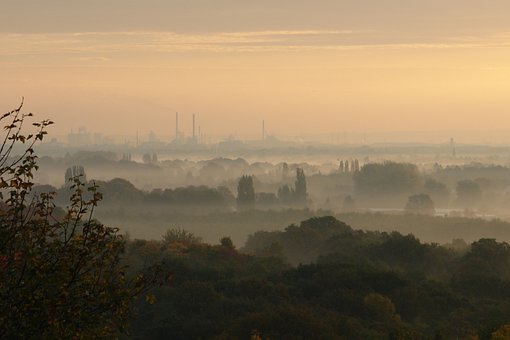It seems as though no matter where you go or what time of day it is, you are surrounded by a constant stream of pollution that constantly puts its toll on your lungs and creates various problems. In many countries, the level of ozone and other pollutants is steadily rising due to increasing industrial activities. According to scientists, ozone-depleting substances are responsible for almost 90% of air pollution (smog) and cause serious ailments.
Ground level ozone is known as a smog. The resulting chemical reaction produces harmful gases, such as carbon dioxide which are then released into the air and cause damage to human health, especially those who live where smog has been reported to occur. In this article, we will discuss some diseases which occurs due to polluted air (smog) and ways to improve your health.

How Does Smog Affect Our Lung Function And Health?
The effect of smog on your body is dependent on how much or how frequently you’ve breathed in polluted air. Smog has an adverse impact on many different areas of our health. Some effects may not show immediately while others become apparent over several years.
Many respiratory problems that come about due to smog include asthma, bronchitis, pneumonia, heart disease, emphysema, and COPD (chronic obstructive pulmonary disease). You may also experience headaches, nausea, and dizziness because of this polluted air. If your local air-quality index is at or above 10, you should contact a healthcare provider. It is important to know that what type of pollution can damage your health before dealing with it.

Breathing In Smog And What Did You Do To Protect Yourself From Being Sick?
Breathing in polluted air like in smog is a very common occurrence. If you live in an urban area, chances are you will have to breathe in some sort of smog on a regular basis. This can lead to a wide array of health issues like, irritated eyes, sore throats and headaches. There are some steps you can take to protect yourself:
- Stay in-doors as much as possible while it’s smoggy outside especially if you are suffering from a respiratory illness. If you do leave your house, choose public transportation or walk rather than drive.
- Don’t exercise outdoors whenever ozone-levels reach to unhealthy level.
- Wear a mask when out in polluted areas.
- Wipe down your face with wet wipes or moisturize it.
- Don’t smoke cigarettes or use tobacco products while being exposed to smog.
- Use an air purifier, it is recommended to grow plants at your home which will be worked as an air purifier.
- Always check weather forecasts.
- Don’t set fire to wood or trash.
Areas Where Smog Has Been A Major Concern
Smog can be caused by many factors, including poor air quality in urban areas. Local governments must set health standards for air quality in order to protect public health. This will help reduce the burden of illnesses like lung cancer or COPD. In most cases, cities need to raise their minimum hourly limits on nitrogen dioxide emissions in order to reduce exposure to air pollution. To determine if an area has good air quality, check the levels of three pollutants: nitrous oxide (N2O), sulfur dioxide (SO2), and particulate matter (PM).
According to studies, higher levels of PM in indoor environments usually indicate that there’s some level of pollution indoors. Excessive concentrations of particles in the lungs can lead to certain types of lung diseases that occur by inhalation. These include chronic rhinitis, conjunctivitis, and allergic bronchopulmonary disease. When exposed to air pollution, people can become ill, and they should talk to their doctor about ways to improve their health. Here are a few tips for improving air quality in your neighborhood.

In addition to having clear rules in place, here are three tips that can help prevent smog:
Consider Ventilation
Smog problems often occur in poorly ventilated areas, so if your home or business have insufficient ventilation, consider adding windows to increase fresh air circulation. Open windows or doors can provide additional light and cool outdoor temperatures. If possible, try opening windows in cold weather season to allow outside air to flow into the building. Your home may already have window coverings that help keep out dust and smoke. However, this could result in a reduction in air quality. If windows and doors do not open as much as is required, consider using fans if you cannot completely close windows and doors.
Use Air Quality Testing Equipment
If your city or town does not routinely test its air quality for pollutants, find one that meets your needs. Many companies offer EPA-approved tests. Make sure you read the lab instructions carefully. Some labs recommend testing every four hours during heavy traffic periods or after working in front of fluorescent lights.
Clean Up Around Your Home
If you own a big house or apartment, take care to clean up around it regularly. Dirty gutters can accumulate debris and create breeding grounds for mosquitoes and bacteria. Keeping a professional mop run on hot water can help remove surface dirt and grime. Dust around rugs and furniture. Replace pillows regularly to keep them free of germs. Finally, check your furnace and appliances regularly to keep them running smoothly. Proper maintenance will keep your environment healthy.

Bottom line
Do not wait for any type of problem to develop because fixing it yourself can save money and time later. Smog effects can be severe for human health. By adopting some habits you can change your polluted environment to a healthy environment, and you so can breathe in clean air.